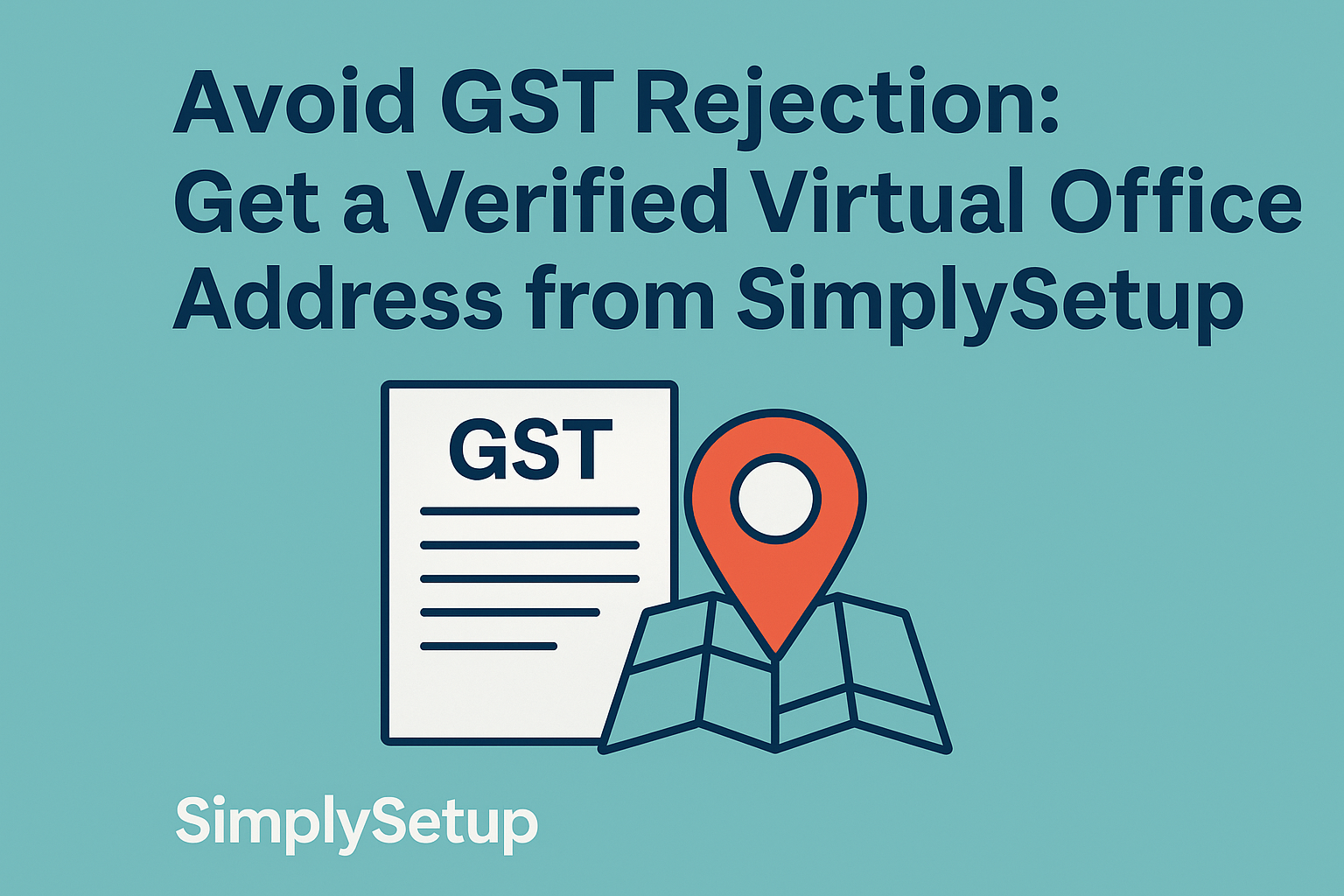Businesses in India have changed how they work since the Goods and Services Tax (GST) system was put in place. The CGST Act, 2017, Section 25(2) says that any business that does business in more than one state must get separate GST registration in each state. This gives the government more power over businesses and makes things more open, but it also makes things much harder and more expensive for new businesses, small businesses, and online sellers.
In this case, a virtual office for GST registration is a legal, cheap, and quick way to meet state compliance requirements without having to move.
According to Section 25(2) of the CGST Act, “A person seeking registration under this Act shall be granted a separate registration for each State or Union territory, in which he is liable to be registered.”
Businesses that sell goods or services in more than one state, such as Maharashtra, Karnataka, and Delhi, need to get three separate GST registrations. For each registration, you need to have a real principal place of business (PPOB) in that state.
But it’s not always possible to have offices in different states. This is where the GST registration virtual office comes in. It gives you a real business address that you can use to sign up.
The Compliance Burden on Companies That Do Business in More Than One State
It’s not enough for businesses to just register in more than one state when they grow. It includes paying rent, filling out paperwork, hiring people, and paying utility bills on time. For traditional setups, you need:
A physical location in each state.
Lease or rental agreements in the name of the business.
Bills for utilities, owner NOCs, and proof of signs.
Local liaisoning to make sure GST is the same in every state.
These costs can add up quickly, which makes it hard for businesses that are growing to move to other states. The virtual office for GST registration solves these problems by meeting all of the paperwork and verification needs at a much lower cost.
What does it mean to have a virtual office for GST registration?
A certified service provider sets up a virtual office for you to register for GST. This is a real address for a business. It lets businesses use that address as their main place of business (PPOB) or extra place of business (APOB) for GST registration and communication without having to rent an office.
Usually, each package comes with:
rent agreement and NOC in the name of the company
utility bill as proof of address
business sign board
Handling of mail and packages
Help GST officers check documents
According to the GST department, this setup is perfectly legal and follows the rules in CGST Rules Rule 8 and Rule 25.
How virtual offices help you follow GST rules in more than one state
1. An address that is legal in every state
The virtual office for GST registration meets the legal requirement in Section 25(2) by giving a verified address in every state. Once they get the green light, businesses can easily add more than one APOB to the same GSTIN or get a new GSTIN for each state.
2. Growth that doesn’t cost a lot
Instead of paying lakhs for rent, deposits, and staff salaries, businesses can run their businesses through virtual offices for as little as ₹7,000–₹10,000 per year per state. This lets you comply without being there in person, which saves a lot of money on fixed costs.
3. Paperwork that is easier to understand
Service providers check that all the GST documents you need, such as the NOC, the rent agreement, and the utility bills, are in the right format. This makes it less likely that you will be turned down during officer verification. A good virtual office for GST registration package makes sure that all the paperwork is ready to be approved quickly.
4. Easier to check officers
Under Section 25 and Rule 25 of the CGST Rules, officers can visit the business in person to check on it. Virtual office providers can help with GPS-tagged photos, local reps, and signs. This makes it easier to check things and speeds up the process of getting approval.
5. Managing Compliance from a Central Location
Businesses can keep track of, renew, and manage all of their state GST registrations from one dashboard. TheGSTCo and other companies offer platforms that let businesses keep track of multiple GSTINs, see their filing statuses, and keep an eye on compliance deadlines—all in one place.
In real life, this is an example: Many states have eCommerce sellers
Imagine an online store owner in Delhi who wants to sell on Amazon across India. The seller needs to have a local GST number in every state where they use Amazon’s warehouse (Fulfillment Center). According to Section 25(2), the seller must register in every state.
Using a virtual office, the seller can sign up for GST in those states. This lets them:
Register quickly without having to rent warehouses.
Use the virtual address as PPOB or APOB.
Ship products legally from Amazon FCs.
Make sure that all areas follow GST rules.
This solution has helped thousands of sellers in India grow without having to pay for office space.
The government recognizes it as legal and valid.
Many businesses want to know if they can register for GST from a virtual office. Yes, as long as the documents are real and come from the right person, either the property owner or the coworking space.
The GST department will accept these addresses as long as:
The rent agreement clearly states that the property will be used for business; and
The owner or landlord issues the NOC
The address on the utility bill is the same.
The signboard is shown when the verification is done.
After registering, businesses can still do business online, use digital communication tools, and follow GST rules.
Important Benefits That Go Beyond Following GST
1. A professional look for your brand: Customers, banks, and marketplaces are more likely to trust your business if it has an address in a city like Bengaluru, Mumbai, or Gurugram.
2. Receiving and Sending Mail and Packages: The virtual office provider will send all of your business mail and packages to the address you gave them.
3. Flexibility to Scale: Businesses can add or remove states at any time, depending on how they want to grow.
4. One-stop documentation support: Well-known providers handle everything from writing contracts to sending them to the GST portal, making sure that everything is done right.
Choosing the Right Virtual Office Provider
Most people agree with the idea, but not all service providers follow the rules for GST paperwork. When picking a virtual office for GST registration, make sure the provider has:
Locations that the government has checked out and clear ownership papers.
Rent agreements that have been notarized or registered.
Helps with quick verification of officers.
Sends out updates on renewals and compliance to keep things open.
For example, TheGSTCo has verified virtual offices in more than 12 states and has helped more than 30,000 businesses. Their 95%+ approval rate and real-time support make it easy to add GST to more than one state.
In the end
The CGST Act’s Section 25(2) makes an important rule: “one registration per state of operation.” This makes tax management better, but it can be hard for businesses that want to grow all over India.
Choosing a virtual office for GST registration is a legal way for businesses to meet this requirement. This will help them save money and make it easier for them to follow the law in more than one state, all without losing their legitimacy or efficiency.
In today’s digital and eCommerce-driven world, the virtual office has changed from a way to save money to a way for businesses to go national with full legal support.



